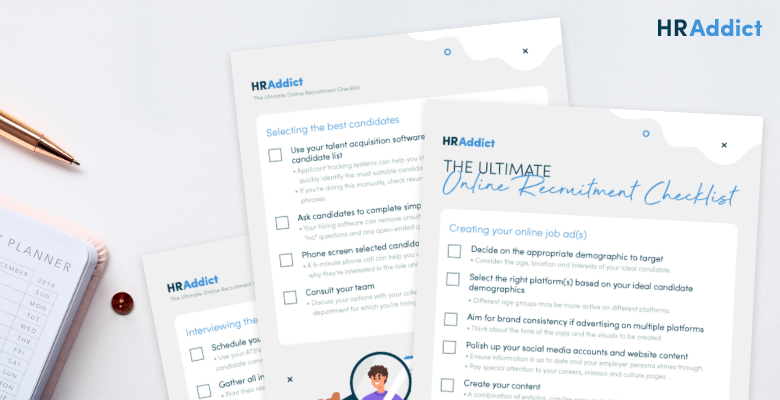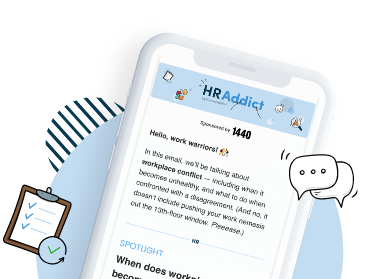As recruiters begin to migrate into the digital realm, online recruitment has quickly become the preferred means of talent scouting. As a result, many companies are now paying closer heed to their online recruiting strategies, with social media proving a particularly effective way of sourcing new employees.
Indeed, professional networking platforms such as LinkedIn have created a targeted, easily accessible pool of candidates, allowing recruiters to prescreen potential hires based on the information on their profiles. However, as with any tool or method, there are disadvantages to using it.
To give you some examples, we’ve compiled a brief overview of the main advantages and disadvantages of using online recruitment, including the most important things you should consider when e-hiring.
So, if you’re thinking of taking your next employee search onto the online job market, this is what you need to weigh up.
TABLE OF CONTENTS:
The advantages of online recruitment
As you will see below, the benefits of online recruitment are numerous. Some of the biggest plus-points are as follows:
1. It’s cost-effective
When you post a job ad on Facebook, you can pay for as much or as little exposure as you want and target it to a very specific audience. Indeed, if you manage your campaign effectively, you can save plenty of precious cash while attracting applicants who are the perfect fit for your vacancy.
2. It’s immediate
Most job posts — and replies — appear in real time. This can help you either increase your efforts to attract more qualified candidates, a different set of candidates (early- instead of mid-career professionals, for example) or even stop candidates from applying if you’ve already found the right person for the job.
3. You can reach a bigger audience
Out of the 8 billion human beings living on planet Earth, more than 5 billion use the internet. These numbers are only growing, which means that, day by day, you are gaining access to a wider talent pool, especially if you’re hiring remotely.
And not only can you target more people with little effort, but you can also use numbers and data to pick the most appropriate channels depending on the age groups you want to attract. For example, you’re a lot more likely to find candidates in the 30–49 demographic on Facebook than Twitter.
4. It’s easy
Almost anyone can post a job advertisement online because most established job boards make the process clear, easy to understand and user-friendly.
Conversely, the process is very simple for the applicant, too, making it quick and painless for interested parties to apply on the spot instead of mailing résumés and written applications through the post.
5. You can make your job ad more dynamic
Unlike static offline campaigns, your online job ads can be more eye-catching and creative, standing out to a wider audience. For example, your recruitment campaign could consist of a series of short videos shared on social media outlining the benefits of working for your company and your mission. Or they could be entirely out-of-the-box and unexpected, like Google’s hidden aptitude test designed to attract and recruit skilled software engineers.
The more you can promote your company culture, the more relevant candidates you’ll attract who value the same things as the rest of your team and make a good fit.
6. It’s flexible
The internet gives you plenty of flexibility with regards to controlling your posts and the applications you receive. If you post in a newspaper and want to amend the job advert, though, you would likely need to pay for an entirely new ad. With online posts, most platforms will allow you to edit, update or remove your job post whenever you wish.
7. It’s durable
Newspapers and other forms of printed media have a very limited lifetime, dependent on their publishing cycle. Most classified publications have a biweekly publishing cycle, meaning that your ad will only be seen for that relatively small amount of time. On the other hand, online job posts will stay live until the author or the host website removes them.
8. It’s accessible
No matter where you are in the world, you can perform all those management tasks described above if you have an internet-enabled device and connection. You can modify your job posting, see how many replies you have and even communicate with candidates directly.
9. It expedites the hiring process
The creativity, flexibility and immediacy that come with online recruiting methods can attract plenty of relevant applicants quickly, leading to a shortened hiring process and helping you save time.
Indeed, statistics show that the majority of HR practitioners agree, with nearly half (47.3%) stating that online recruiting brings candidates in faster, compared to just 8.7% who don't see the benefit at all.
10. It allows confidentiality
Some employers prefer to keep their names or companies private. This is especially true when a job role or organization is too sensitive or controversial to be advertised online. With online recruitment, employers can conceal the name of their firms or even search and contact candidates directly without the need of posting a job advertisement.
The disadvantages of online recruitment
For all its perks, there are downsides to online recruitment that you should also think about. Consider the following:
1. Costs can spiral
Depending on the online platform you use, you may have to pay a subscription fee or other costs to post your vacancy. Some sites might require a membership fee or charge for extra services like application tracking or analytics to manage your advert.
Also, if you’re not getting the kind of response you’re looking for, the costs of leaving the ad to run longer can accumulate.
2. It can be difficult to measure their effectiveness
Not all online recruitment services offer an in-depth analysis of your posting; therefore, it can be hard to figure out what is and isn’t working and how to optimize your ad.
Of course, this is a common problem in offline recruitment, too, but it’s worth remembering that just because you’ve posted an ad online doesn’t mean that you will always have access to reams of metrics and supporting data.
3. It’s informal
For some roles, companies perceive that online job postings — particularly on social media — can give off the wrong image of their company. This is particularly true for executive-level roles, particularly at firms (or in industries) that have a strong corporate or professional culture.
It’s not uncommon, for example, for high-caliber firms to advertise C-level roles in reputable print publications such as The Economist or the Financial Times.
4. It attracts bad candidates
As previously mentioned, it’s very easy for people to apply for jobs online; this can potentially be a negative point as well, though. Posting a position online usually results in hundreds of applicants, many of whom will not be suitable for or serious about the role, thus diluting the quality of your talent pool.
5. There’s a lot of competition
The main downside to following trends is that everybody else is doing the same thing. As a result, your post can quickly become buried under a mountain of other job offers, forcing you to either pay more for extra exposure or risk not being seen.
When it comes to social media, you’re also at the mercy of Facebook or Twitter’s algorithms, meaning that who you target is essentially in the hands of somebody else.
6. It could lead to lost labor hours
If you’re receiving large volumes of applications that need to be pruned, there are technical issues with the platform you’re working with, or the job ad itself constantly needs to be changed, then the online recruiting process can start to become difficult to manage.
This either detracts you from other aspects of your job or requires somebody else to supervise the process closely.
7. It may attract fraudulent applicants
Some applications might be fake to get information about the company or hiring officer (a common espionage tactic). Simultaneously, spammers might use the information posted online to promote a service or product to your company.
If you give away too many details in your ad, malicious hackers can even use the information to potentially gain access to your company’s IT systems.
8. It can affect communication
Communicating with prospective employees through a screen can lead to misconstrued messages or wrong assumptions. However, talking to someone face to face (at a job fair, for example) can clarify what a person is like, at least by first impressions, while also maintaining clear communication with one another.
9. It can quickly become ineffective
Most social media users, put plainly, are sick of seeing ads. According to SurveyMonkey, roughly 75% believe that there are just too many ads on social networking platforms. This means that seeing the word “sponsored” on your job advertisement might automatically cause some users to scroll past your post fast.
Besides that, you may also want to bear in mind a phenomenon called “ad fatigue”. That’s when social media users begin to consciously tune out the ads they see repeatedly. So, if you keep running the same ads because you’re unable to fill your vacancies, you’ll risk driving away potentially decent candidates.
10. You may miss out on great employees
Online recruitment can sometimes fail to attract good employees if your company’s online persona isn’t up to scratch. Candidates usually rush to the organization’s website or social media to get a sense of its reputation, mission and overall culture. If they see that yours aren’t impressive enough, they may turn down the job proposal or just ignore your advertisement altogether.
Free Online Recruitment Checklist
Are you ready for online recruitment?

Grab our comprehensive Online Recruitment Checklist to make sure you’ve got all bases covered and you hire the best candidate!
Final thoughts
Of course, online recruitment is a valuable tool to be used when looking for new hires. The most effective strategy would be to conduct multiple simultaneous campaigns, including traditional media, headhunters and external recruiting agencies.
Have you ever successfully used e-recruitment? What was your experience? Let us know in the comments section below!
This article was originally published back in 2019. Updated by Electra Michaelidou.

